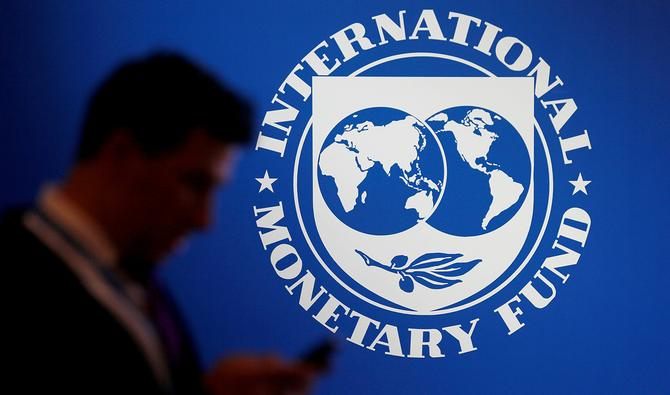LAHORE: The International Monetary Fund (IMF) has reached a staff-level pact with Pakistan on a $3 billion stand-by arrangement, the lender said, a decision long awaited by the South Asian nation which is teetering on the brink of default.
The deal, subject to approval by the IMF board in July, came hours before the current agreement with the IMF expires later on Friday. Although essentially a bridge loan, it offers much respite to Pakistan, which is battling an acute balance of payments crisis and falling foreign exchange reserves.
The agreement will enable Pakistan to achieve economic stability, and put the country “on the path of sustainable economic growth, God willing,” Prime Minister Shehbaz Sharif said.
Pakistan will receive formal documents on the deal later on Friday from the IMF, Finance Minister Ishaq Dar told Reuters, which he said he would “sign, seal and return by tonight.”
He had said on Thursday the deal was expected any time soon.
Pakistan’s sovereign dollar bonds were trading higher after the announcement, with the 2024 issue enjoying the biggest gains, up more than 8 cents at just above 70 cents in the dollar, according to Tradeweb data.
The gains were most pronounced in shorter-dated bonds, reflecting lingering skepticism over the longer-term fiscal outlook for the country.
The country’s domestic stock and currency markets were closed on Friday due to Eid festival holidays.
With sky-high inflation and foreign exchange reserves barely enough to cover one month of controlled imports, analysts say Pakistan’s economic crisis could have spiralled into a debt default in the absence of an IMF deal.
The $3 billion funding, spread over nine months, is higher than expected. The country was awaiting the release of the remaining $2.5 billion from a $6.5 billion bailout package agreed in 2019, which expires on Friday.
The IMF funding will also unlock other bilateral and multilateral external financing and debt rollovers, particularly from friendly countries like Saudi Arabia and the UAE, which have already pledged around $3 billion.
“This will support near-term policy efforts and replenish gross reserves, with the aim of bringing them to more comfortable levels,” the IMF said.
POWER PRICE HIKES
The new stand-by arrangement builds on the 2019 program, IMF official Nathan Porter said on Thursday, adding that Pakistan’s economy had faced several challenges in recent times, including devastating floods last year and commodity price hikes following the war in Ukraine.
“Despite the authorities’ efforts to reduce imports and the trade deficit, reserves have declined to very low levels. Liquidity conditions in the power sector also remain acute,” Porter said in a statement.
“Given these challenges, the new arrangement would provide a policy anchor and a framework for financial support from multilateral and bilateral partners in the period ahead.”
Porter also pointed out the power sector’s buildup of arrears and frequent power outages.
Reforms in the energy sector, which has accumulated nearly 3.6 trillion Pakistani rupees ($12.58 billion) in debt, has been a cornerstone of the discussions with the IMF.
The IMF would want steadfast policy implementation by Pakistan to overcome challenges, “particularly in the energy sector,” the statement said.
“The authorities’ program also includes ongoing efforts to strengthen the viability of the energy sector (including through a timely FY24 annual rebasing),” the lender said, which means a rise in electricity tariffs in the fiscal year.
Government sources told Reuters that the hike will come ahead of the IMF board review of the bailout in mid-July.
PAINFUL REFORMS
Islamabad has taken a slew of policy measures since an IMF team arrived in Pakistan earlier this year, including a revised 2023-24 budget last week to meet the lender’s demands.
Other adjustments demanded by the IMF before clinching the deal included reversing subsidies in power and export sectors, hikes in energy and fuel prices, jacking up the key policy rate to 22 percent, a market-based currency exchange rate and arranging for external financing.
It also got Pakistan to raise over 385 billion rupee ($1.34 billion) in new taxation through a supplementary budget for the 2022-23 fiscal year and the revised budget for 2023-24.
Going forward, the IMF said, the central bank should remain pro-active to reduce inflation and maintain a foreign exchange framework.
The painful adjustments have already fueled all time high inflation of 38 percent year-on-year in May.
“The FY24 budget advances a primary surplus of around 0.4 percent of GDP by taking some steps to broaden the tax base and increase tax collection from under-taxed sectors,” Porter said, adding it also ensured space to strengthen support for the vulnerable through a cash handout program.
He said it will be important that the budget is executed as planned, and authorities resist pressures for unbudgeted spending or tax exemptions in the period ahead.
“This new program is far better than our expectations,” said Mohammed Sohail of Topline Securities in Karachi, adding there were a lot of uncertainties on what would happen after a new government comes to power later in the year.
“This funding of 3 billion dollars and for 9 months will definitely help restore some investor confidence,” he said.
($1 = 286.1500 Pakistani rupees)
















